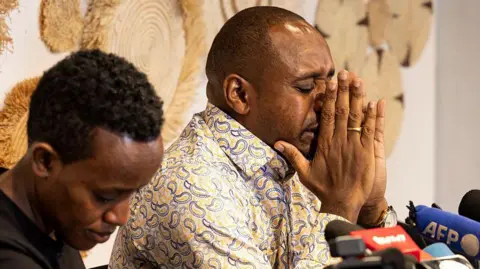'Struggling to be alive': Kenyan activist speaks of 'sexual torture' in Tanzania
 AFP via Getty Images
AFP via Getty ImagesWarning: This article contains details that some readers may find distressing.
A Kenyan activist has told the BBC that he is "struggling to be alive" after allegedly being sexually tortured in detention in Tanzania last month.
Boniface Mwangi said he had decided to speak despite the "shame and guilt of being sodomised with all manner of things".
Mwangi said he was held in Tanzania after going to the country to show solidarity with detained opposition politician Tundu Lissu.
At a press conference in Kenya's capital, Mwangi tearfully claimed that he was stripped naked, hung upside down, beaten on his feet and sexually assaulted while detained.
The police chief in Tanzania's main city of Dar es Salaam disputed Mwangi's account and told the BBC they were "opinions" and "hearsay" coming from activists.
"If they were here, I would engage them, I would ask them what are they saying, what do they mean... In law, those things are called hearsay or hearsay evidence," Jumanne Muliro told the BBC.
He said Mwangi should make a report to the authorities for investigation.
Tanzanian President Samia Suluhu Hassan's government has been accused by rights groups of becoming increasingly repressive in the run-up to October's presidential and parliamentary elections.
Regional rights groups have called for an investigation, and Amnesty International said Tanzanian authorities should hold to account those responsible for the "inhuman" treatment.
Mwangi said he was held by Tanzanian authorities for several days along with Ugandan activist Agather Atuhaire, who had earlier also spoken of being raped in detention.
She attended the press conference in Nairobi on Monday, where Mwangi described his sexual assault in graphic detail.
He said his torturers would sexually assault him and tell him to say "asante" (thank you in the Swahili language) to their president.
Mwangi added that the officers told him they were filming everything and would leak the footage if he spoke about what he had gone through.
Mwangi told the BBC Newsday programme that the torture had left him in mental anguish.
"You have a lot of nightmares, you have a lot of thoughts, and you're alone in the dark, and you're thinking you're going to get killed. So that entire mental anguish lives with you," he said.
Mwangi said he wanted his medical records be made public so that "what happened to me should never happen to anyone else".
"I have wounds all over my body, I have wounds on my private parts, I have wounds on my feet, I have two broken toes, I have fractures… So I'm still struggling".
Mwangi and Atuhaire were among several activists who travelled to Tanzania two weeks ago in solidarity with Lissu who was appearing in court on treason charges that he denies.
He has been demanding sweeping changes, saying current laws do not allow for free and fair polls, which the government denies.
Lissu was arrested on 9 April following his rallying call of "no reforms, no election".
Mwangi told the BBC that their visit to Tanzania was to highlight Lissu's "sham case", adding that this "wasn't taken lightly" by the authorities.
President Hassan warned at the time that she would not allow activists from neighbouring countries to "meddle" in Tanzania's affairs.
The whereabouts of Mwangi and Atuhaire were unknown while they were being held, sparking widespread condemnation.
Mwangi said his "abduction" was shocking in how brazen it was as he had been "picked from a very prominent hotel".
"So having been abducted during broad daylight and never knowing where I was, and I was still tortured, means that the Tanzanian government doesn't care about what people think about it," he told the BBC.
Earlier, Atuhaire said that despite Uganda being "very dictatorial", she did not imagine she "would find a worse foreign country, a worse government".
Mwangi said their experience showed "how broken" countries in East Africa were.
"So it makes me more of a pan-African in this fight," he told the BBC.
The US Department of State's Bureau of Africa Affairs previously said it was deeply concerned by the reports of the two activists' mistreatment, noting that Atuhaire had been recognised by the department "in 2024 as an International Women of Courage Awardee".
Other activists, including Kenya's former Justice Minister Martha Karua and former Chief Justice Willy Mutunga were blocked from entering and were deported from the international airport in Dar es Salaam.
Additional reporting by Munira Hussein in Dar es Salaam.
You may also be interested in:
 Getty Images/BBC
Getty Images/BBCGo to BBCAfrica.com for more news from the African continent.
Follow us on Twitter @BBCAfrica, on Facebook at BBC Africa or on Instagram at bbcafrica
